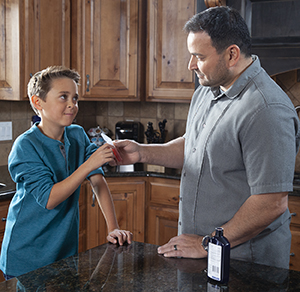A
B
C
D
E
F
G
H
I
J
K
L
M
N
O
P
Q
R
S
T
U
V
W
X
Y
Z
Click a letter to see a list of medical procedures beginning with that letter.
Click 'Back to Intro' to return to the beginning of this section.
Cellulitis (Child)
Cellulitis is a bacterial infection of the skin. If not treated, cellulitis can get into the bloodstream and lymph nodes, and spread all over the body. This can cause very serious illness. Because of this danger, it's important for a child with cellulitis to get medical care right away.
What causes cellulitis?
Even a small cut, bite, or scratch can become infected by germs (bacteria). If this infection spreads to deeper layers of skin, it can become very serious. Cellulitis can affect any part of the skin. But it's often found on the face, arms, and legs. It can't spread from person to person. Certain bacteria can cause cellulitis in children even if there is no cut or scratch. So if a lesion develops that is red and painful, make an appointment for your child to see a healthcare provider right away.
Symptoms of cellulitis
Call the healthcare provider right away if your child has any of these symptoms:
-
An area of skin that swells and is sore, painful, or warm
-
Fever over 100.4°F (38°C)
-
Headache, muscle aches, or joint stiffness
-
Hair loss around the infected area
-
Upset stomach (nausea) and vomiting
-
Redness, bruise, blister, rash, or red streak on the skin that spreads from a cut, scratch, or bite
-
Swollen glands
-
Weakness or exhaustion
Treating cellulitis
 |
| Be sure your child finishes ALL the medicine, even if he or she feels better. |
Cellulitis must be treated by a healthcare provider. Treatment may include the following:
-
A course of antibiotics. Make sure your child takes every dose on time. All the medicine must be finished, even if the child feels better.
-
Skin sample (culture). Your child’s healthcare provider may take a sample of the area to find out which bacteria are causing the infection.
-
Medicine for pain. Your healthcare provider may tell you to give either acetaminophen or ibuprofen. Or you may be told to alternate these medicines. Make sure you give either of these medicines as directed so you don’t give too little or too much. Don't give your child aspirin. Taking aspirin can put your child at risk for Reye syndrome. This is a rare but very serious disorder. It most often affects the brain and the liver.
-
Raising (elevating) the affected area. This may be done to reduce swelling and help the healing process. Your child’s healthcare provider will tell you if this is needed and for how long. If instructed, have your child keep the affected area still and elevated. If the area is on the arm or hand, it should be kept above the level of the heart. If the area is on the leg or foot, it should be kept above the level of the hip.
The symptoms of cellulitis often get better after a few days of treatment. For severe cellulitis, or for cellulitis in an important area such as around the eyes, treatment may be done in the hospital. There, your child will get antibiotics and fluids through an IV (intravenous) line. They will keep a close watch to make sure your child is comfortable and stable.
The importance of handwashing
Always wash your hands with clean, running water before and after touching your child. And teach your child correct handwashing:
-
Wet. Wet your hands.
-
Lather. Apply clean bar soap or liquid soap to the hands, and then place the bar on a rack where it can drain before the next handwashing.
-
Scrub. Rub the hands together and scrub every surface completely for 20 seconds. Hum the "Happy Birthday" song twice if you need a time frame.
-
Rinse. Rinse the hands completely, then dry them.
Online Medical Reviewer:
Marianne Fraser MSN RN
Online Medical Reviewer:
Michael Lehrer MD
Online Medical Reviewer:
Raymond Kent Turley BSN MSN RN
Date Last Reviewed:
2/1/2022
© 2000-2024 The StayWell Company, LLC. All rights reserved. This information is not intended as a substitute for professional medical care. Always follow your healthcare professional's instructions.